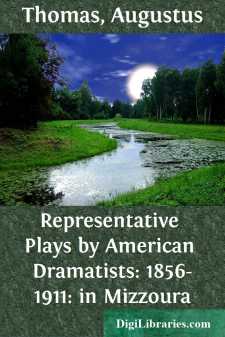Drama
American Books
Sort by:
by:
Clyde Fitch
ACT I A drawing-room at the Hunters', handsomely and artistically furnished. The woodwork and furniture are in the period of Louis XVI. The walls and furniture are covered with yellow brocade, and the curtains are of the same golden material. At the back are two large windows which give out on Fifth Avenue, opposite the Park, the trees of which are seen across the way. At Left is a double doorway,...
more...
by:
Augustus Thomas
AUGUSTUS THOMAS (Born, St. Louis, Mo., January 8, 1859) It is not a new thing for a dramatic author to write prefaces to his plays. We are fortunate in possessing a series of personal opinions in this form that constitute a valuable asset in determining individual attitude and technical purpose. Read Schiller's opening remarks to "The Robbers," Victor Hugo's famous opinions affixed to...
more...
MAJOR ROBERT ROGERS (1727-1795) Robert Rogers, a soldier of fortune, is the Davy Crockett of Colonial times. Born at Dumbarton, New Hampshire, on November 17th (some authorities say 1730, another 1731, while the Dictionary of National Biography says 1727), he was the son of James Rogers, a farmer living in a frontier cabin at Methuen, in upper Massachusetts. Robert's boyhood was spent in an...
more...
by:
John Leacock
JOHN LEACOCK Among the elusive figures of early American Drama stands John Leacock, author of "The Fall of British Tyranny," published in 1776, in Philadelphia. Even more elusive is the identification, inasmuch as his name has been spelled variously Leacock, Lacock, and Laycock. To add to the confusion, Watson's "Annals of Philadelphia," on the reminiscent word of an old resident...
more...
HOW TO BE A GOOD RADIO ACTOR The play in this book has actually been produced on the radio. Possibly you have listened to this one when you tuned in at home. The persons whose voices you heard as you listened, looked just as they did when they left their homes to go to the studio, although they were taking the parts of men and women who lived long ago and who wore costumes very different from the ones...
more...
ROYALL TYLER (1757-1826) William Dunlap is considered the father of the American Theatre, and anyone who reads his history of the American Theatre will see how firmly founded are his claims to this title. But the first American play to be written by a native, and to gain the distinction of anything like a "run" is "The Contrast," by Royall Tyler. Unfortunately for us, the three hundred...
more...
by:
Michael Strange
Act I Scene 1 [An old park with avenues of trees leading away in all directions. Directly in background of stage there is a sheet of water fringed by willow and poplar trees. On the right and left is a high box hedge formed in curves with the top clipped in grotesque shapes mostly of birds. A statue is placed in the centre of each hedge, and beneath the statues are seats. When the curtain rises several...
more...
by:
Bronson Howard
BRONSON HOWARD (1842-1908) The present Editor has just read through some of the vivacious correspondence of Bronson Howard—a sheaf of letters sent by him to Brander Matthews during a long intercourse. The time thus spent brings sharply to mind the salient qualities of the man—his nobility of character, his soundness of mind, his graciousness of manner, and his thorough understanding of the dramatic...
more...
A PROLOGUE TO BE SPOKEN BY BETSY Our scene is the wind-swept coast of Devon. By day there is a wide stretch of ocean far below, and the abutments of our stage arise from a dizzy cliff. The time is remote, and ships of forgotten build stand out from Bristol in full sail for the mines of India. But we must be loose and free of precise date lest our plot be shamed by broken fact. A thousand years are but...
more...
GEORGE HENRY BOKER (1823-1890) The name of George Henry Boker suggests a coterie of friendships—a group of men pledged to the pursuit of letters, and worshippers at the shrine of poetry. These men, in the pages of whose published letters and impressions are embedded many pleasing aspects of Boker's temperament and character, were Bayard Taylor, Richard Henry Stoddard, and Charles Godfrey Leland,...
more...











